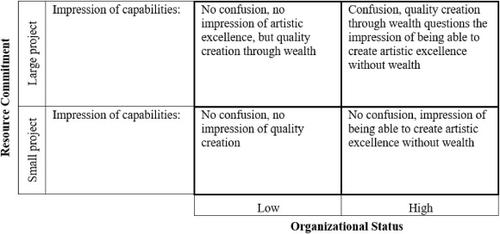Pride cometh before a fall: The incongruence of status and resource commitment signals in the video game industry
IF 7.3
2区 管理学
Q1 BUSINESS
引用次数: 0
Abstract
This study extends the burgeoning literature on social evaluations by investigating the incongruence between two quality signals in the video game industry: resource commitment and organizational status. It is hypothesized that while having one of the signals leads to higher product recognition and, hence, allows firms to capture more value from a product and its demonstrated quality, having both signals can be problematic due to the incongruence of these signals. This is because, in creative industry settings, the occurrence of both signals might send an incongruent message to external audiences (i.e., consumers and industry experts), leading to lower than expected results. My empirical analysis using historical data from the video game industry showed that organizations which featured either a status or a resource commitment signal were able to capture more value from their product quality than organizations that feature both of these signals. In an additional survey study, I found tentative evidence for my theoretical explanations of these findings.

骄傲必将堕落:电子游戏产业中地位和资源承诺信号的不一致性
本研究通过调查电子游戏行业两种质量信号(资源承诺和组织地位)之间的不一致性,扩展了有关社会评价的新兴文献。研究假设,虽然其中一个信号会提高产品认可度,从而使企业从产品及其所展示的质量中获取更多价值,但由于这两个信号的不一致性,同时拥有这两个信号可能会产生问题。这是因为,在创意产业环境中,两种信号的出现可能会向外部受众(即消费者和行业专家)发出不一致的信息,从而导致结果低于预期。我利用视频游戏行业的历史数据进行了实证分析,结果表明,与那些没有出现这两种信号的组织相比,那些同时出现状态信号和资源承诺信号的组织能够从其产品质量中获取更多价值。在另一项调查研究中,我发现了一些初步证据,证明了我对这些发现的理论解释。
本文章由计算机程序翻译,如有差异,请以英文原文为准。
求助全文
约1分钟内获得全文
求助全文
来源期刊

European Management Journal
Multiple-
CiteScore
12.90
自引率
5.30%
发文量
113
审稿时长
74 days
期刊介绍:
The European Management Journal (EMJ) stands as a premier scholarly publication, disseminating cutting-edge research spanning all realms of management. EMJ articles challenge conventional wisdom through rigorously informed empirical and theoretical inquiries, offering fresh insights and innovative perspectives on key management themes while remaining accessible and engaging for a wide readership.
EMJ articles embody intellectual curiosity and embrace diverse methodological approaches, yielding contributions that significantly influence both management theory and practice. We actively seek interdisciplinary research that integrates distinct research traditions to illuminate contemporary challenges within the expansive domain of European business and management. We strongly encourage cross-cultural investigations addressing the unique challenges faced by European management scholarship and practice in navigating global issues and contexts.
 求助内容:
求助内容: 应助结果提醒方式:
应助结果提醒方式:


